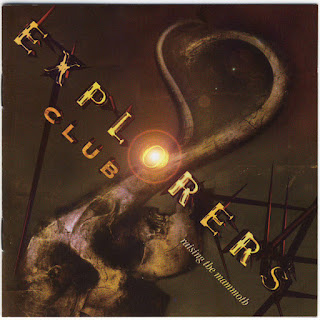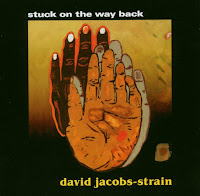V2.35
The brainchild of musician/producer Trent Gardner of the band Magellan, his Explorers Club project gathers together the best and brightest from the progressive rock and metal genres to share ideas and create some daring, adventuresome music. Raising the Mammoth (Magna Carta Records) is the second Explorers Club album and the pedigree of the assembled players includes members of Kansas (Kerry Livgren and Steve Walsh), Dream Theater (John Myung and James LaBrie), Megadeth (Marty Friedman), and Frank Zappa’s band (Terry Bozzio). With talent like this on board, it’s no wonder that Explorers Club is often called a “prog-rock supergroup.”
Raising the Mammoth is a collection of musical passages – some small and finely crafted, others longer and more majestic – strung together into a single, cohesive creative theme. The first extended section offers vocals from Gardner, Walsh and LaBrie, thrown into the stream of instrumental chaos created by the attending musicians. The result is quite invigorating; Gardner’s lyrical poetry containing many hidden directions while the musical undercurrent batters your consciousness like white water rapids along the Colorado River. The instrumental second section is grander in scope, the music often swelling to a crescendo before swerving off into unforeseen directions. The first section of Raising the Mammoth seems to work better than the second, with the instrumental interplay among the musicians showing a brighter chemistry and more disciplined performance. Taken as a whole, however, the hour-long recording is a wonderful example of a proud progressive-rock tradition, the torch carried well by Gardner and his friends.
Contrary to what this humble scribe has long believed, you don’t have to be old to sing the blues (tho’ I would submit that it certainly doesn’t hurt any). Extraordinary guitarist David Jacobs-Strain first performed onstage at the Oregon Country Fair at the tender age of eleven and was named as a faculty member of the Port Townsend Country Blues Workshop in 1999 while still in high school. Jacobs-Strain released his first album before he entered college and Stuck On the Way Back (Northern Blues Music), his sophomore effort, proves that the young blues prodigy has come of age quickly.
Produced by musician Kenny Passarelli, who convinced bluesman Otis Taylor to come out of retirement, Stuck On the Way Back is a magnificent showcase of both Jacobs-Strain’s six-string acumen and his songwriting skills. With sparse musical accompaniment and his stark, powerful guitar playing, the young Jacobs-Strain’s vocals sound as ancient as the music he sings. Original songs like Jacobs-Strain’s apocalyptic “River Was Green” or the discordant “Dark Horse Blues” are terse, muscular affairs with timeless lyrical concerns and strong performances. Covers, such as R.L. Burnside’s classic “Black Mattie” or traditional tunes like “Linin’ Track” are afforded great reverence and excellent delivery. A lyrical collaboration with Taylor, “Black And Blue,” results in a haunting tale of love and betrayal, the music fleshed out by Passarelli’s subtle keyboard work. Unlike a lot of young, white guitarslingers aiming for the late Stevie Ray Vaughan’s crown, David Jacobs-Strain is the real thing, an authentic bluesman with instrumental chops and lyrical maturity the equal of artists twice his age and experience.
Author Andrew Vachss could be considered the literary equivalent of the Delta bluesman. His fictional alter ego, Burke, is the same kind of hustler and street-level survivor that Muddy Waters was in real life while Burke’s adopted “family” is not unlike that which grew up around the Chicago blues giant. Burke, an ex-con, is a city-bred predator whose religion is revenge; his troubled childhood is the stuff that the blues is born of. In Vachss’ novels, Burke is typically getting even with someone, usually over something done to a child (reflecting Vachss’ own work as a lawyer and children’s advocate).
Vachss has written better than a dozen Burke novels to date, but the latest, titled Only Child (Alfred A. Knopf) may be his best riff yet. Forced to leave New York City, Burke has spent the last few years (and couple of novels) hiding out in the Pacific Northwest. Burke slips back into the Big Apple under the shadow of night and reconnects with his family, which includes an Asian martial arts expert, a reclusive scientific genius and a hustling, streetwise philosopher. Low on cash and eschewing his usual cons and hustles as overpopulated with amateurs, Burke goes back to his roots as a “man for hire” and private investigator without papers. Hired by a Mob boss, Burke assembles his crew to hunt down the murderer of the Mobster’s daughter that nobody knew existed.
Vachss has branched out over the last few Burke novels, changing locales and the situations he throws his protagonist into, and he continues to experiment with Only Child, taking crime fiction to new heights. Vachss writes with a gritty realism and street-inspired rhythm that only Elmore Leonard comes close to matching, his Burke a dark avenger and hunter of men that could only exist in the imagination. If you’re looking for fiction a little headier and more headstrong than what exists at the top of the best-seller charts, give Andrew Vachss and Only Child a shot. Chances are you’ll go back to the store for more of Burke… (View From The Hill, September 2002)




No comments:
Post a Comment